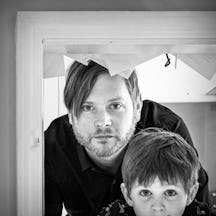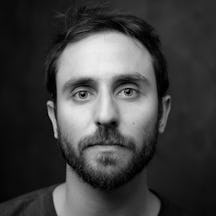Strength, power, respect. As a child, novelist Stuart Evers learned that this was masculinity. During his teenage years he believed he’d broken free and could create his own way of being a man, but with fatherhood those inherited values began to creep back into his life.
Father of the house
Words by Stuart Eversphotography by Thomas S G Farnettiaverage reading time 6 minutes
- Article

Though my grandfather was a committed socialist, he ran his family like a paranoid despot, exerting almost total dominion over his wife, daughter and son. Even when visiting him as a child, I understood, at least in a subliminal way, that crossing his threshold meant stepping into a different regime: one that was oppressive, masculine and dictatorial.
My grandfather grew up in a poor London family in the 1920s. Any idea of manhood – a word he would recognise more than ‘masculinity’ – was gleaned from those around him: his family, his fellow workers on the docks, the men with whom he went to war. Manhood, for my grandfather, meant strength, fortitude, respect and power. It meant keeping a family safe, fed and clothed. It meant knowing one’s place. It meant never deviating from that role, lest the whole world came tumbling down.
Real men don’t hug.
I knew him only in retirement, a sedentary man waited on by my grandmother, bemoaning his ill health. Sometimes I would comb his hair, the white silk below his crown. He said it was ‘poofy’ – I remember him saying this, a catch-all insult – but allowed me to do it anyway. There were often moments of such tenderness – tough dads can make pussycat grandfathers – but they were never shown towards my father. At the threshold on our visits, my father was greeted with a handshake; on leaving, the same hand would be extended. Real men don’t hug.

The politics of the family
The first political system we experience is the one that greets us at birth. Our parents or guardians, in whatever formulation they are comprised, set the parameters, the freedoms and restrictions, the terms of our upbringing. How we react to this governance – whether to kick against it, hone it or perpetuate it – has a significant influence on our later life, especially if one comes to raise one’s own family: it is the state against which we will inevitably measure our success or failure.
In ‘Patrimony’, Philip Roth writes of his own father: “He wasn’t just any father, he was the father, with everything there is to hate in a father and everything there is to love.” It’s a line I think of in relation to my father’s relationship with my grandfather. There was affection and love, but it was rarely expressed. Most cruel were the times when, after a few drinks, my grandfather would promise a day trip or treat for his young son. The next morning, my grandfather would have no memory of the promise, and chasten my father for suggesting he had.
The cruelty of this was not the disappointment, but the dropping of the mask, of seeing a different father buried beneath the despot. An alternative father who, despite his upbringing and his era, was more interested in his son than he was in structures. It showed my father, I believe, that there is more to being a man than just being the man of the house.
In ‘The New Feminism’, Natasha Walter writes, “The more fathers are involved with their children, the less likely … their children are to be limited by sex-specific behaviour.” I have been fortunate to be around my children almost constantly since birth; my father was less present.

The hero and the mermaid
In the early years of my life, my father was often away. As such, he occupied a strange space: part returning hero, part invader. He loved me – never any doubt about that – but there were constraints to that love. He did not like me dressing as a mermaid and pretending to swim on the carpet (he called me a ‘poof’ as my grandfather did); he didn’t like holding my hand when I was older, or hugging me in public. If I acted up in public, he would say, “Stop that, people will think there’s something wrong with you.” Which would make me think, “Let them, Dad. Let them.” But not say it.
I spent my early teens in a push-me-pull-you relationship with masculinity: on the one hand wanting to conform to those inherited ideas of manhood, to make my father proud; on the other wishing to smash its last vestiges. I remember having an argument with my father about the importance of being strong. I asked him to explain why strength in a man was so desirable, and the very question angered him. He could not conceive, I think, that a man could be ambivalent about having physical prowess.
More: Discover how beliefs about masculinity influence the way men experience their mental health.
As I grew up, I mixed more with girls and slowly came to see masculinity as performative and personal, natural and faked, privilege and privation. I was giddy with the realisation. I had seen through it all! I was free! No longer was I yoked to iterations of my grandfather’s steadfast patriarchy!
But this was an illusion, the hubris of youth. After having children, I saw some of those old, patriarchal ideas sneak back and wave brightly. For his second birthday, my son wanted a blue guitar and a princess dress, and I asked him if he was really sure he wanted the dress. For World Book Day there was a choice of a Gangsta Granny outfit or a Peter Rabbit costume, and I pushed him towards the bunny rather than the biddy. When he wanted to wear a dress to a party, I suggested other outfits. Don’t stand out. Don’t agitate. Don’t rock the boat. My grandfather’s mantra, if he’d ever had one.

How the past persists
Past iterations of masculinity still run within deep within us, no matter how much we might beat them down, or how we might wish to reject them. As Eva Figes writes in ‘Patriarchal Attitudes’, “One can slash out at the undergrowth, but it has a way of growing up again overnight, whatever one does or says.”
This ‘undergrowth’ throws long shadows; it exposes further darker spaces. I repeat conversations with my son that I had with my father. I tell him how lucky he is, just as my father told me, though I always hated when he did so; I say, “Because I said so,” despite the fact it used to drive me crazy when my father said it. I look after the children for a week, a weekend, an evening, and though I tell myself not to be ridiculous, I expect wild praise for doing something that is my express role in life.
Worse, I find myself frustrated that my sons do not fear my anger the way I once feared my father's. I know that I should be grateful – wildly praised, even(!) – that this is the case, but somewhere lurking is a sense that I am less of a man, less of a father. That I am disrespected. And I can hear my grandfather say that: “Do not disrespect me.” It worries me, that voice. It worries me that it is there when I kiss my children goodnight, no matter how much I try to deny it.
About the contributors
Stuart Evers
Stuart Evers’ debut, 'Ten Stories About Smoking', won the London Book Award in 2011, and his highly acclaimed novel, 'If This is Home', followed in 2012. His latest collection, 'Your Father Sends His Love', was shortlisted for the 2016 Edge Hill Short Story Prize. In 2018, Evers won the Eccles British Library Writer’s Award - one of Europe's richest prizes for a work in progress.
Thomas S G Farnetti
Thomas is a London-based photographer working for Wellcome. He thrives when collaborating on projects and visual stories. He hails from Italy via the North East of England.

